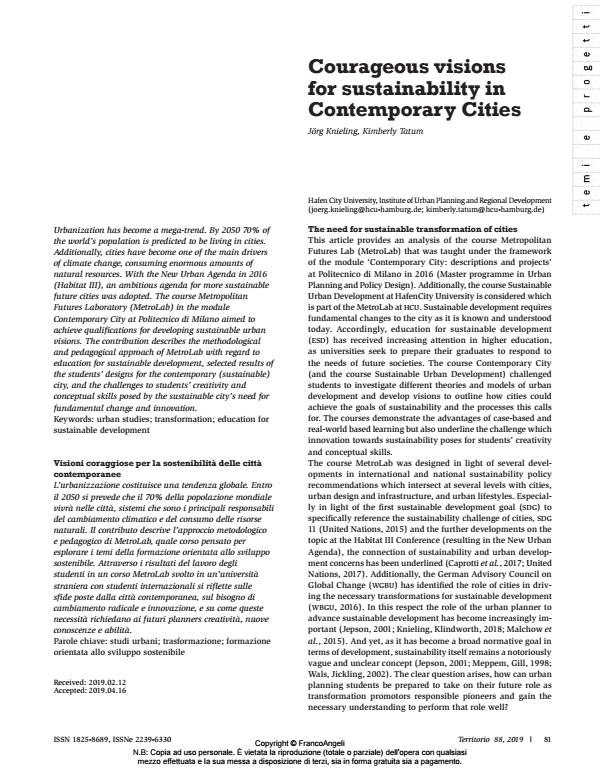Courageous visions for sustainability in Contemporary Cities
Titolo Rivista TERRITORIO
Autori/Curatori Jörg Knieling, Kimberly Tatum
Anno di pubblicazione 2019 Fascicolo 2019/88
Lingua Inglese Numero pagine 8 P. 81-88 Dimensione file 1513 KB
DOI 10.3280/TR2019-088013
Il DOI è il codice a barre della proprietà intellettuale: per saperne di più
clicca qui
Qui sotto puoi vedere in anteprima la prima pagina di questo articolo.
Se questo articolo ti interessa, lo puoi acquistare (e scaricare in formato pdf) seguendo le facili indicazioni per acquistare il download credit. Acquista Download Credits per scaricare questo Articolo in formato PDF

FrancoAngeli è membro della Publishers International Linking Association, Inc (PILA), associazione indipendente e non profit per facilitare (attraverso i servizi tecnologici implementati da CrossRef.org) l’accesso degli studiosi ai contenuti digitali nelle pubblicazioni professionali e scientifiche.
Urbanization has become a mega-trend. By 2050 70% of the world’s population is predicted to be living in cities. Additionally, cities have become one of the main drivers of climate change, consuming enormous amounts of natural resources. With the New Urban Agenda in 2016 (Habitat III), an ambitious agenda for more sustainable future cities was adopted. The course Metropolitan Futures Laboratory (MetroLab) in the module Contemporary City at Politecnico di Milano aimed to achieve qualifications for developing sustainable urban visions. The contribution describes the methodological and pedagogical approach of MetroLab with regard to education for sustainable development, selected results of the students’ designs for the contemporary (sustainable) city, and the challenges to students’ creativity and conceptual skills posed by the sustainable city’s need for fundamental change and innovation.
Parole chiave:Urban studies; transformation; education for sustainable development
Jörg Knieling, Kimberly Tatum, Courageous visions for sustainability in Contemporary Cities in "TERRITORIO" 88/2019, pp 81-88, DOI: 10.3280/TR2019-088013